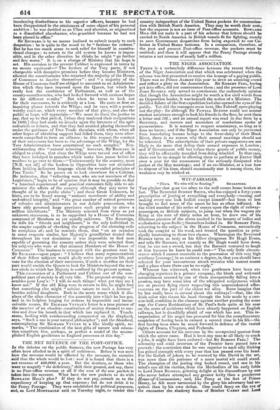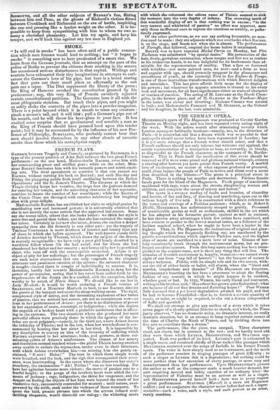WIT-PASSAGES.
"Clown,. We wits will be flouting." SHARSPERE.
THE pitcher that goes too often to the well comes home broken at last. The Reverend SYDNEY SMITH, who has enjoyed a forty-years prescription of jeering at everything and everybody—teasing and making every one look foolish except himself—has been at last brought to feel some of the smart he has so often inflicted. In the third number of his series of essays upon the right of railway- passengers, as British subjects, to jump out when the wagons are flying at the rate of thirty miles an hour, be drew one of his felicitous pictures of the alarm excited in the breasts of ladies and ecclesiastics upon findin3 themselves locked in. Sir ROBERT PEEL, adverting to the subject in the House of Commons, sarcastically took the essayist at his word, and treated the question as prin- cipally interesting to those two classes. Whereupon the Reverend SYDNEY turns as testy as his fellow clergyman Sir Hugh Evans, and tells Sir ROBERT, not exactly as Sir Hugh would have done, that he can use a sword, but that the Baronet ventured to laugh at him because he knew he could not—" The only little circum- stance which I cannot reconcile to the possession of this very high attribute [courage] in so eminent a degree, is, that you should have selected for your uncourteous attack enemies who cannot resent and a place where there can be no reply."
Whoever has witnessed, when two gentlemen have been ex-
changing repartees in a private company, the blank and awkward astonishment created by one of them unexpectedly falling into a passion, may have some idea of the whispered conjectures which are at present flying about respecting this unprecedented effer- vescence on the part of the oldest wit alive. Some imagine that he has really been- in earnest about the railways!—that, like the Irish sailor who thrust his head through the hole made by a can- non-ball, confiding in the chances against another passing the same way, the Canon Residentiary of St. Paul's feels quite at his ease on the score of accidents which have already happened on English railways, but is dreadfully afraid of one which has not. This in- terpretation of his anger has procured for him the complimentary suspicion of having been in earnest a second time in his life—the first having been when he stood forward in defence of the vested rights of Deans, Chapters, and Prebends.
Others account for his soreness by the unexpected quarter from
which the arrow came. Had it been any man at all likely to crack a joke, it might have been endured—but Sir ROBERT PEEL I The solemnity and staid decorum of the Premier have passed into a proverb : the conviction that he was superior to such silly frisking has gained strength with every year that has passed over his head. For the Goliah of jokers to be worsted by this David in the art, was more than the patience of a mere mortal wit could stand. The champion of the jesting ring looked round, and saw in his mind's eye all his victims, from the Methodists of his early fields to Lord JOHN RUSSELL, grinning delight at his discomfiture by one who never before attempted any greater levity than a ponderous House-of- Connansism; and, like Percy at the feet of Prince Henry, he felt more tormented by the glory his adversary had ac- quired than by his own defeat. One could fancy on the eve of the encounter the shadowy forms of Brother CAREY and Lord SiDstoUTu, and all the other subjects of SYDNEY'S fun, flitting between him and PEEL, as the ghosts of Richard's victims flitted between Crookback and Richmond on the eve of battle, inspiriting the one and pressing like a leaden weight on the other. It is im- possible to keep from sympathizing with him to whom we owe so many a cherished pleasantry. Let him try again, and keep his temper, and we'll back him against any ten men in England yet.



























 Previous page
Previous page